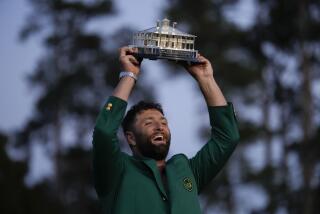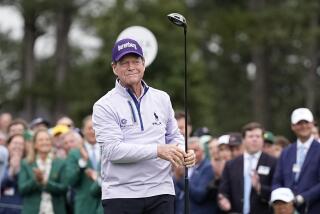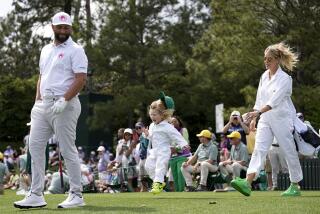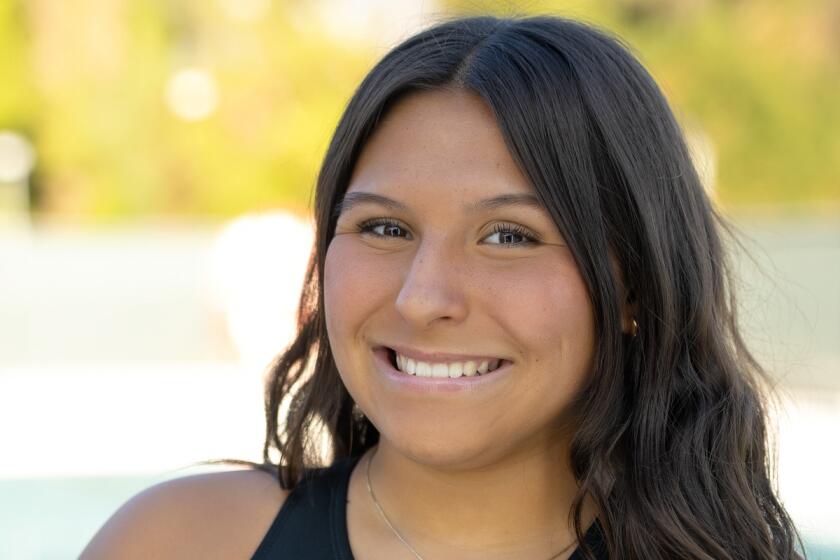This Year, It Will Be a Masters Without Martha
- Share via
PALM BEACH GARDENS, Fla. — The road to the Masters is no longer such a bumpy ride.
No one is asking players if they are outraged that Augusta National has never had a female member. No editorials are urging Tiger Woods, himself a minority, to boycott the major championship he has won three times.
The big rivalry these days is Tiger and Vijay, not Martha and Hootie.
The talk on the PGA Tour is about who’s playing the best golf, not who’s wearing the green jackets.
One year after Martha Burk led a relentless campaign against the home of the Masters and its all-male membership, the incendiary issue that once threatened to become an inferno has all but fizzled.
“If it was as big a deal as she made it out to be, we’d still be talking about it,” Charles Howell III said. “We’re still talking about Iraq. We’re still talking about Osama bin Laden. We’re still talking about the economy. We’re still talking about how to play better golf.
“But I don’t think anyone is talking about Martha Burk.”
Burk, head of the National Council of Women’s Organizations, has been in the news only twice this year.
One time was to demand that Fred Ridley resign his membership at Augusta National upon his election in February as president of the U.S. Golf Association.
The other was to announce she would not return to the Masters to protest.
After nine months of vitriolic debate between Burk and Masters chairman Hootie Johnson, the controversy faded in a grassy lot about a half-mile away from the gates of Augusta National. That was as close to the club as local authorities allowed Burk, citing safety concerns along Washington Road.
The protest turned into a circus, complete with an inflatable pig, a one-man faction of the Ku Klux Klan, a smattering of Burk protesters and just as many people protesting Burk. Media outnumbered them all.
Burk said her absence from Augusta this year should not be a sign that her fight is over.
“Far from it,” she said. “We’re not giving up. We’re going forward with a corporate campaign. We’ll have a new Web site on Augusta before the tournament, heavily slanted toward the corporate end of things. We’re changing our emphasis toward more scrutiny of who the members represent.”
Johnson, however, believes he had the public’s support all along.
“It should be obvious by now that the story was not only hollow, but also ridiculously misguided,” Johnson said.
“Privacy and freedom of association are integral parts of the foundation of America and are important to a wide variety of groups,” he said. “Standing firm for those principles was the right thing to do.... The public has spoken, and we are simply looking forward to hosting another exciting Masters that everyone can enjoy.”
Burk spends most of her time at home, working on a book to be published next year on how Augusta National’s discrimination of women is emblematic of the problems women face in the business world.
Sorting through a stack of newspaper clippings, Burk came across the original column about the club’s all-male membership that inspired her to write to Johnson.
When asked by Golf Digest magazine who won the 2003 Masters, Burk replied with a laugh, “I did.”
“If you count the column inches of coverage and the ability to raise a profile in the press, there’s no question I won,” she said. “As far as the guy at the top of the scoreboard, I couldn’t tell you.”
Burk was in the news almost every day since July, when Johnson issued a scathing statement that Augusta National would not be bullied into inviting a woman to join “at the point of a bayonet.”
Burk attacked corporate sponsors of the Masters for ignoring their public policies on gender discrimination. So Johnson made the Masters the first sporting event to be commercial-free on network television.
Two newspapers published a list of the club’s 300 members and the companies they represented. One editorial asked Woods to boycott the Masters; another urged Augusta National members to replace Johnson.
Burk asked PGA Tour commissioner Tim Finchem to no longer recognize the Masters as an official tournament.
The media pressure was unlike anything golf had seen.
“It was a non-golf media frenzy that made it what it was,” Davis Love III said. “It was just a distraction. It didn’t have anything to do with playing the golf tournament. We were sick of it.”
Woods, the No. 1 player in golf, caught the brunt of the heat.
“It was tough because they kept asking the same questions from every conceivable angle,” he said. “I think that’s what all of us got annoyed about. Once we gave the media our opinions, that wasn’t good enough. They would come at us from a different angle. And they would be at us every single week.
“But once it was over and done with, they moved on to the next biggest thing. And that was Annika.”
Indeed, the media left Burk for another woman.
Not long after Mike Weir won the Masters, attention shifted to Annika Sorenstam preparing for the Colonial, the first woman in 58 years on the PGA Tour.
Nowadays, any conversation about women and golf is more about the seven females who have competed on men’s tours, including 14-year-old Michelle Wie in Hawaii.
With the Masters only a month away, the focus is almost exclusively on golf.
Arnold Palmer is playing in his 50th consecutive Masters. And Vijay Singh is closer to Woods’ No. 1 ranking than anyone in the last five years.
The only scrutiny of Woods is that he failed to win a major last year for only the second time. The big controversy is how Love handled a heckler at the Match Play Championship.
The Masters again will go without TV sponsors. Johnson said he liked the commercial-free broadcast so much that he’s giving the three sponsors -- Coca-Cola, IBM and Citicorp -- another year off.
Burk sees it differently.
“I don’t think it will ever be business as usual again, as long as they continue to discriminate against women,” she said. “It’s possible some company that doesn’t care about its public image -- like Hooters or the Howard Stern radio show -- could be a sponsor. But I don’t think any legitimate corporation would do it.”
While Burk won’t be at the Masters, she says her campaign will not be forgotten.
“I wish we could have had a clear victory down there in regard to the demonstration,” she said. “On the other hand, we got our point across. The American people know what this is about now.”
More to Read
Go beyond the scoreboard
Get the latest on L.A.'s teams in the daily Sports Report newsletter.
You may occasionally receive promotional content from the Los Angeles Times.










